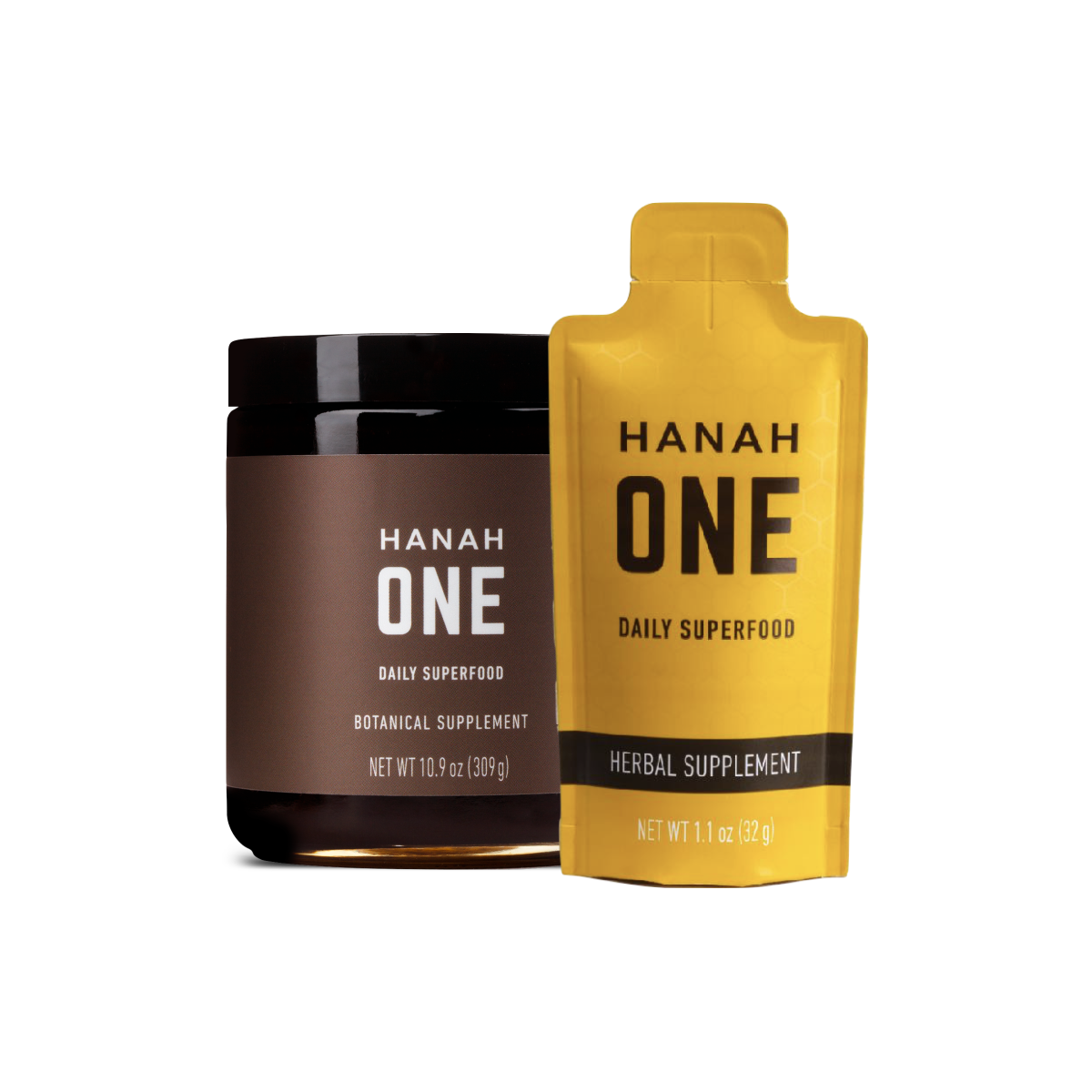Not all ingredients are created equal — why ashwagandha is pure magic (part 2 of 2)

As "the magical herb" gains momentum in the mainstream, let's break down the research-backed benefits that are winning over everyone from pro athletes to our grandmas
In part one, we examined the three main jewels in “the king of herbs’” crown — its adaptogen, rasayana and nootropic properties. Now, let’s talk about what every day benefits these properties facilitate. It’s helpful to know these categorizations, but the reason ashwagandha is seeping into modern wellness culture is because people have heard of and are telling their friends and family about its myriad of health boosting results.
Combats stress and anxiety
Cortisol, your fight-or-flight hormone, is produced in the brain and is highly influential to overall health and psychological balance. When cortisol levels rise, it is perceived in the body as anxiety or stress. While this natural, internal alarm system can be beneficial in detecting potential dangers, a prolonged period of increased cortisol can derail the body’s most important functions, leading to a number of health problems, including chronic stress and anxiety.[1] However, studies have shown that adults with a history of chronic stress who were given a high concentration of full-spectrum ashwagandha root experienced a significant reduction in cortisol levels and a reduction in scores on all of the stress-assessment scales.[2] Another study concluded that the glycowithanolides in ashwagandha mimic the body’s own stress-reducing relaxation hormones, which reduces cortisol and helps to maintain homeostasis, a sense of presence and focus, throughout times of stress.[3]
Increases cardiorespiratory endurance
Athletes that find ashwagandha tend to share it with everyone they know, claiming its horsepower-like effects. Interestingly, ashwagandha means “smell of horse” in the classical Indian language of Sanskrit, because it is said to hold the strength of a stallion. Two published medical studies in which the efficacy of ashwagandha supplementation was tested on groups of adult athletes found that the herbs improved cardiorespiratory endurance across the board, as well as improved their general quality of life.[4, 5]
Boosts brain function
We already explored the way in which ashwagandha works within the brain to help manage stress and anxiety, but that’s not the end to its brain boosting power. Some studies suggest it can make users more intelligent by increasing acetylcholine levels in the brain. Well, maybe not more intelligent in the literal sense, but it can enhance focus, concentration and memory, all cognitive functions which contribute to one’s overall intelligence. Participants in such studies furthermore demonstrated greater improvement in executive function, sustained attention and information-processing speed. [6]
Remember when we talked about rasayanas and the state of youthfulness and vitality they promote? This youth-like health is the reason rasayana therapy is often prescribed to ageing individuals to help combat the ill effects of advanced age. Research shows that ashwagandha not only slows, but may halt or even reverse the neurological decline by regenerating and repairing neurons.[7]
Improves muscle strength and recovery
To explain this benefit, we have to return to the topic of cortisol. As we stated, this hormone produced in the brain has a lot of influence on the body’s most important functions. One of cortisol’s many functions is to break down muscle in order for the body to have more energy in times of need. It’s a great biological fail-safe, should we ever need it, but what athlete wants their hard work in the weight room set back by an overactive hormone they can’t even see? Higher cortisol also means lower testosterone output — a major factor in muscle repair, growth and recovery. Furthermore, increased cortisol levels slow down digestion, which in turn, can cause the body to store fats.[8] A scientific study reported a significant increase in muscle strength and testosterone along with a decrease in body fat percentage and exercise-induced muscle damage in subjects supplementing with ashwagandha.[9]
Provides antioxidants
Antioxidants help the body to fight oxidative stress. Oxidative stress occurs when there is an imbalance between free radicals and antioxidants in the body. Free radicals are oxygen-containing molecules with an uneven number of electrons, allowing them to easily interact with other molecules to cause chemical reactions in the body — good and bad. It’s when the imbalance becomes so large that there are not enough antioxidants to keep the free radicals in check.[10] When this occurs, free radicals can begin wreaking havoc on tissues, DNA and proteins, which make up a significant portion of the body’s make up. With free radicals causing damage to these crucial parts of the body, we become more vulnerable to diseases over time.[11] This is where antioxidant-rich herbs like ashwagandha can help reinstate that balance.
Promotes healthier skin and hair
Stress, hormones, environmental pollution and ageing are some of the common causes of problems related to skin and hair, but luckily for us, they’re all factors that ashwgandha have been shown to address. When stress is high or ongoing, our bodily functions are not performing at their best. By keeping cortisol levels in check, ashwagandha can help combat stress-induced acne or hair loss. The rasayana properties of the herb make it a rejuvenator of skin by supplying natural antioxidants, anti-inflammatories and hydrators which help to revitalize and revive skin cells. For hair, antioxidants, amino acids and iron in ashwagandha help strengthen the hair shaft and prevent breakage. There is not a lot of conclusive research on ashwagandha’s effect on skin and hair, however, one scientific study reported that the participant experienced a significant decrease in hair loss after just two months of taking the medicinal root.[12]
Fortifies immunity
All of the benefits we have covered up until now create a trickle down effect to support immune health. Our immune systems become compromised when important bodily functions are imbalanced. Prolonged stress, increased cortisol levels and oxidative stress can all lead to a weakening of the immune system, leaving us open to attack from illness and a system that is not up to fighting it off. Therefore, the stress-busting, cortisol-lowering, balance-inducing effects of ashwagandha that we examined above significantly contribute to immune system maintenance as well. Research even shows that ashwagandha can increase the production of antibodies, or the proteins that fight off invading bacteria and viruses.[13]
HANAH does ashwagandha differently
HANAH Ashwagadha+ is produced in the traditional Ayurvedic way. Ayurveda is a 5,000 year old system of natural healing with the primary goal being to help people live long, healthy and balanced lives. Originating in India, Ayurveda promotes the concept of food as medicine, the use of herbal compounds alone and in powerful combinations and other practices that look to prevent disease before it happens through a conscious, healthy and active lifestyle. The Ayurvedic method of producing ashwagandha involves first soaking the roots in grass-fed nutrient-dense cow’s milk and then drying it in the sun (pictured below). This process not only softens the bitter taste of ashwagandha, it creates a fermented quality, or “post digestive,” which supercharges its bioavailability and allows it to be more easily absorbed by the body — making it much more impactful and effective. In fact, a clinical study from 2008 concluded that taking ashwagandha with cows’ milk increases its effects on strengthening the immune system.[14]

Another differentiator — HANAH Ashwagandha+ is wild-harvested where it grows naturally and organically in Kerala, India. Local farmers and villagers hand pick this wild or “beyond organic” herb where the soil has been replenished after each growing season using natural and often ancient methods to maintain the soil’s health and integrity of the land for future harvests. From these harvests, we create small artisanal batches of ashwagandha. This means we create smaller quantities, support traditional agricultural practices, have less impact on the environment, support local farmers and obtain the purest and highest quality product.
In part one of this blog, we examined the three classifications of ashwagandha — adaptogen, rasayana and nootropic — which provides a deeper understanding of its functions as a medicinal herb. Next, we dove deep into the most highly claimed benefits of ashwagandha, and most importantly, the scientific research that backs them up. We hope that in exploring ashwagandha beyond the headlines and listicles, you are able to gain a deeper understanding and appreciation for “the magical” herb. All that’s left is to give it a try for yourself. When choosing from the myriad of ashwagandha supplements on the market, keep in mind that not all ingredients are created equal. Like all HANAH products, Ashwagandha+ is created following our primary guiding principle: the highest levels of purity and quality for results you will feel.
Learn more about HANAH Ashwgandha+
- Read part one in this two-part blog series
- Not all ingredients are created equal: HANAH Ashwagandha+
- Why athletes love ashwagandha
- Explore our ashwagandha recipes
Disclaimer: Statements throughout this publication have not been evaluated by the FDA. These products are not intended to diagnose, treat, cure or prevent any disease process.
Sources:
[1] “Cortisol: What It Does & How To Regulate Cortisol Levels.” WebMD, WebMD, 22 Dec. 2018, www.webmd.com/a-to-z-guides/what-is-cortisol.
[2] Chandrasekhar, K, et al. “A Prospective, Randomized Double-Blind, Placebo-Controlled Study of Safety and Efficacy of a High-Concentration Full-Spectrum Extract of Ashwagandha Root in Reducing Stress and Anxiety in Adults.” Indian Journal of Psychological Medicine, Medknow Publications & Media Pvt Ltd, July 2012, www.ncbi.nlm.nih.gov/pmc/articles/PMC3573577/.
[3] DiPasquale, Robin, et al. “Effect of Ashwagandha on Tests of Cognitive and Psychomotor Performance.” Natural Medicine Journal, www.naturalmedicinejournal.com/journal/2014-05/effect-ashwagandha-tests-cognitive-and-psychomotor-performance.
[4] Choudhary, Bakhtiar, et al. “Efficacy of Ashwagandha (Withania Somnifera [L.] Dunal) in Improving Cardiorespiratory Endurance in Healthy Athletic Adults.” Ayu, Medknow Publications & Media Pvt Ltd, 2015, www.ncbi.nlm.nih.gov/pmc/articles/PMC4687242/.
[5] Shenoy, Shweta, et al. “Effects of Eight-Week Supplementation of Ashwagandha on Cardiorespiratory Endurance in Elite Indian Cyclists.” Journal of Ayurveda and Integrative Medicine, Medknow Publications & Media Pvt Ltd, Oct. 2012, www.ncbi.nlm.nih.gov/pmc/articles/PMC3545242/.
[6] DiPasquale, Robin, et al. “Effect of Ashwagandha on Tests of Cognitive and Psychomotor Performance.” Natural Medicine Journal, www.naturalmedicinejournal.com/journal/2014-05/effect-ashwagandha-tests-cognitive-and-psychomotor-performance.
[7] DiPasquale, Robin, et al. “Effect of Ashwagandha on Tests of Cognitive and Psychomotor Performance.” Natural Medicine Journal, www.naturalmedicinejournal.com/journal/2014-05/effect-ashwagandha-tests-cognitive-and-psychomotor-performance.
[8] Jimmy Kennedy, CF-L1. Ashwagandha's Effects on Muscle Growth and Recovery, blog.insidetracker.com/ashwagandha-effects-muscle-growth-recovery.
[9] Wankhede S;Langade D;Joshi K;Sinha SR;Bhattacharyya S; “Examining the Effect of Withania Somnifera Supplementation on Muscle Strength and Recovery: a Randomized Controlled Trial.” Journal of the International Society of Sports Nutrition, U.S. National Library of Medicine, pubmed.ncbi.nlm.nih.gov/26609282/.
[10] Dix, Megan. “Oxidative Stress: Definition, Effects on the Body, and Prevention.” Healthline, Healthline Media, 29 Sept. 2018, www.healthline.com/health/oxidative-stress.
[11] Pizzino, Gabriele, et al. “Oxidative Stress: Harms and Benefits for Human Health.” Oxidative Medicine and Cellular Longevity, Hindawi, 2017, www.ncbi.nlm.nih.gov/pmc/articles/PMC5551541/.
[12] Kalani, Amir, et al. “Ashwagandha Root in the Treatment of Non-Classical Adrenal Hyperplasia.” BMJ Case Reports, BMJ Group, 17 Sept. 2012, www.ncbi.nlm.nih.gov/pmc/articles/PMC4543599/.
[13] Talan. “Ashwagandha Can Help Restore Your Immune System.” NATURELO Premium Supplements, NATURELO Premium Supplements, 4 June 2019, naturelo.com/blogs/articles/ashwagandha-can-help-restore-your-immune-system.
[14] “Clinical Research Supports Effectiveness of Ashwagandha to Boost Body's Immunity.” National University of Natural Medicine, 19 Oct. 2020, nunm.edu/2008/08/clinical-research-supports-effectiveness-of-ashwagandha-to-boost-bodys-immunity/.











Leave a comment
This site is protected by hCaptcha and the hCaptcha Privacy Policy and Terms of Service apply.